Cuban exchange teaches more than academics
February 27, 2011 by Jeffrey Yip · Leave a Comment
Alexis Wiessler believes we have a lot to learn from Cuba.
Wiessler, a horticultural student, was one of six students who went to Cuba in October 2010, through an exchange program with the Institute for Sustainable Horticulture, to participate in field research at the University of Sancti Spiritus.
“I just thought going to Cuba and seeing how they do things would be really beneficial to my career further down the road,” she said.
Cuba is a leader in sustainable farming practices, which is using more environmentally friendly techniques to grow crops. Wiessler and some of her colleagues worked on a project using a fungus to fight different plant diseases. They also used plants to attract insects that are natural enemies of other insects that are harmful to crops.
Overall, she believed the research went well, but they did have some problems.
“There were always pigs and goats and turkeys in the fields eating everything,” she said.
For the 26-year-old, the exchange became more than just about sustainable farming. While she knew living in Cuba would be difficult, nothing could have prepared her for just how different things would be. Cramped living quarters and little variety of food were just a couple of the challenges she faced.
It was her brief glimpse into the lives of everyday Cubans that Wiessler will remember most. She said that despite the hardships the Cubans faced every day, they are still a happy, friendly people who appreciate what little they do have.
“It was really refreshing to see people who have so little just not being affected by it that much,” she said.
The biggest challenge for Wiessler was living in a socialist country. She said things we take for granted, such as freedom of speech, don’t happen in Cuba.
“It was kind of scary at times, because we didn’t really know if we were overstepping any bounds,” she said.
As difficult as the exchange was at times, Wiessler doesn’t regret going and encourages other students to go on similar exchanges and keep an open mind about new experiences.
“I always knew we were lucky in North America, but it’s totally a different thing living in another country and really see how lucky we are,” she said. “As hard as it was, I miss it a lot. I started to get really comfortable there.”
Food for Fines aims to help hungry students
February 17, 2011 by Jeffrey Yip · Leave a Comment
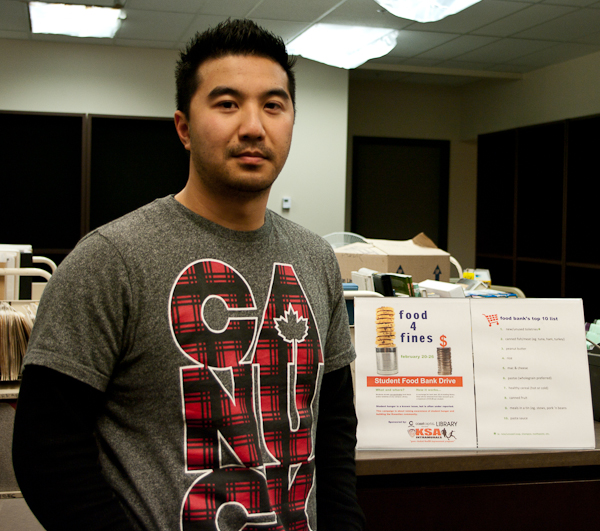
KSA Health & Recreation Manager, Eddie Lee, hopes the Food for Fines drive from Feb. 20-26 will give students incentive to donate to the food bank. Photo by Matt Law.
The KSA has partnered with the Kwantlen library to raise awareness about student hunger and generate donations for the KSA food bank.
“We wanted to provide incentive for them to donate. At the same time we wanted them to recognize that other students are in need and that they can really help and make a difference,” said Eddie Lee, KSA health and recreation manager.

A lack of donations have forced the KSA to spend students' money to fill the demands of the the food bank. (Photo by Matt Law.)
The Food for Fines program, Feb. 20-26, allows students to bring in non-perishable food items or new or unused toiletries to any campus library and receive $2 off fines for overdue items, up to a maximum of $10.
Lee got the idea from other universities that have had success with similar programs.
According to Lisa Hubick, public relations librarian, the library was happy to participate. She said the library had a history of helping local community food banks, but this was the first time they will be able to directly help out Kwantlen students.
While she admits that fines aren’t a huge problem with Kwantlen students, she hope students will take advantage of the Food for Fines program and help out fellow students.
Currently, the KSA food bank buys most of the food they need. According to Lee, they spend about $500 a semester on food bank supplies.
“The idea was to tug at the heart strings a little bit, as opposed to just doing a regular food drive,” Lee said of the program.
For more information on the food bank visit http://kwantlen.weebly.com/student-food-bank.html.
Eagles vs. Kermodes: In pictures and sound
February 12, 2011 by Jeffrey Yip · Leave a Comment
After an unfortunate road trip to Prince George, the Kwantlen Eagles’ men’s team returned home to face Quest University’s Kermodes on Friday, Feb. 4, a team they’d never lost to at home. Coming into the game the Eagles had lost seven straight, bringing their record to 1-11 for the season.
Kwantlen looks for greener pastures with farm school
January 30, 2011 by Jeffrey Yip · 1 Comment
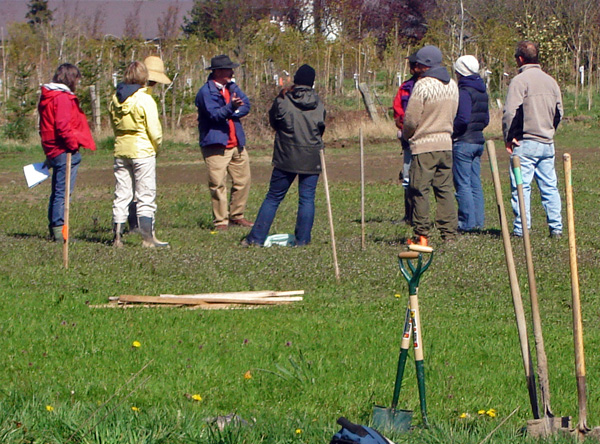
Kent Mullinix, director of the Richmond Farm School (centre dark blue jacket and orange sweater), explains orchard planning to students before they plant a pear orchard during the program's first year in 2010. (Photo by Mary Gazetas)
Old McDonald had a farm and so does Kwantlen.
On Feb. 3, the Institute for Sustainable Horticulture will launch the second year of its farm school. The Richmond farm school is an extension education program designed and intended to prepare people to “engage in local-scale, human-intensive” farming. And, according to the farm school director Kent Mullinix, this isn’t an ordinary university program. There are no textbooks, no assignments, no exams and no grades.
“It’s taught offsite and the whole school is in partnership with the City of Richmond. These are all unusual things for Kwantlen,” he said.
The program runs on a not-for-profit, cost-recovery basis: the farm school is completely funded by student fees and grants.
“We got a very generous grant from Vancity. They gave us $50,000, and with it we’re going to procure equipment and, most notably, we hired a farm school coordinator,” Mullinix said.
Anna Rallings is the program’s farm school coordinator and was a student in the program’s first class.
“I really liked working with chickens,” she said. “We built a chicken coop. And this year the new farm school students are going to be hatching chickens.”
Rallings, a graduate of environmental sciences, found that she didn’t like the day-to-day grind of sitting in an office and writing reports.
“I went into the farm school kind of with a blank slate, thinking that maybe one day I’ll farm. And now myself and another student, Charles Wilson, we’ve started our own farm, Natural Urban Growers in Richmond” she said.
The farm school isn’t just about teaching people how to farm.
“Folks of your generation need to understand that their lives are going to change radically. The fossil-fuel-based economy and lifestyle that you now live is going to cease,” Mullinix said.
“Virtually all of the students have already established careers and are fairly accomplished. They were in the farm school because they see sustainability as a preeminent issue.”
According to Mullinix, agriculture now “is absolutely unsustainable.”
The farm school’s goal is to change the way we farm and make it more sustainable. They’ve partnered with the City of Richmond and two Richmond NGOs to put in place various tools and demonstrations of what they call Municipal Enabled and Supported Agriculture or MESA.
“The farm school is a MESA tool,” Mullinix said. “Municipalities in the very near future are going to become very concerned with their agri-food systems, because it’s going to become inextricably linked to the sustainability of their community.
“If we can advance and achieve a sustainable agri-food system, then we can demonstrate to all that sustainability will enhance our lives not detract from them. If we don’t get this one figured out, we are in, as they say where I come from, a heap of trouble,” he said.
Rallings agrees and sees the farm school as an important step to making the world more sustainable.
“There’s a serious need for people to get into agriculture,” she said. “The nature of agriculture is changing because of climate change, but there’s also community development and the demand for local, organic food. The farm school’s really going to help bring people into the industry who might be on the outside and don’t know where they fit.”
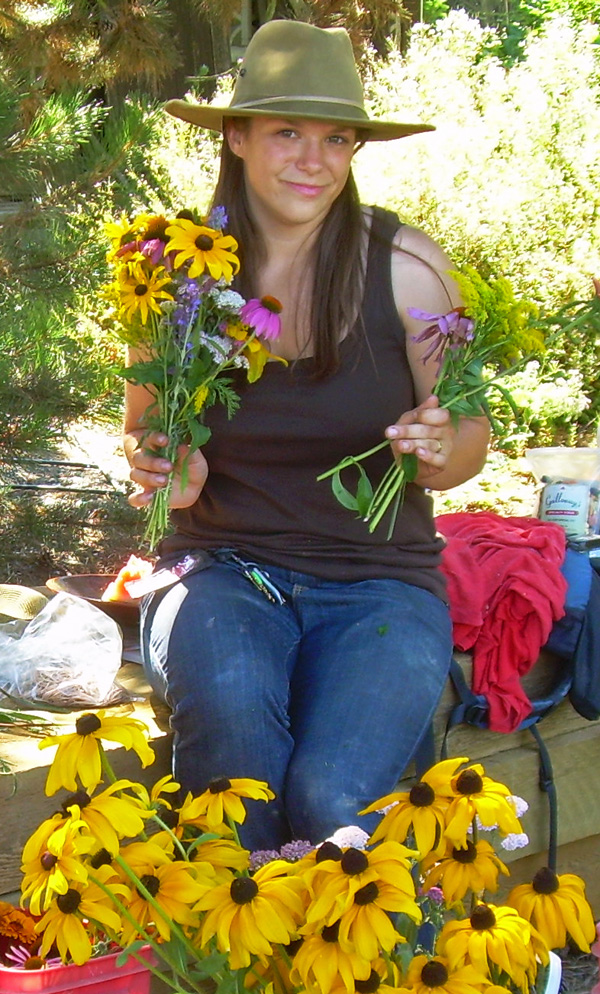
Anna Rallings prepares for the Steveston Farmer's Market during the first year of Kwantlen's Richmond Farm School in 2010. Following the program, she and a fellow student started their own farm, Natural Urban Growers, in Richmond. Rallings is also the farm school's coordinator. (Photo by Kimi Hendess)
Kwantlen duo reaches finals at national business competition
January 17, 2011 by Jeffrey Yip · Leave a Comment
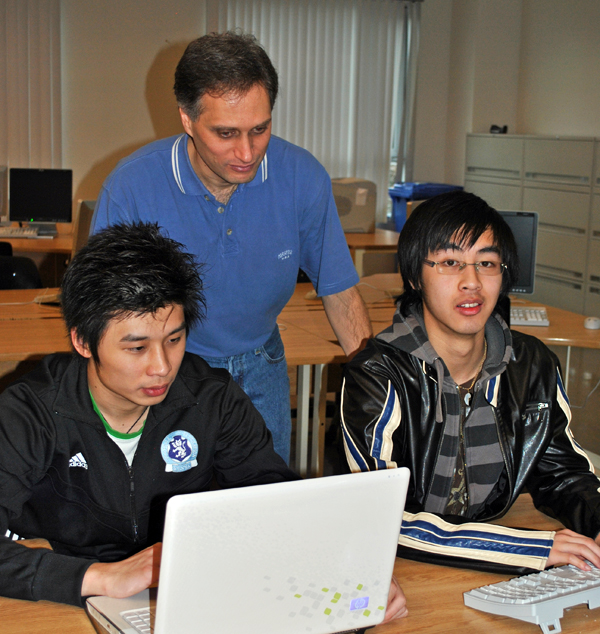
Joe Zhao, left, coach Kamal Masri, centre, and Steven Vu represented Kwantlen in the final round at the 33rd annual Inter-Collegiate Business Competition at Queen's University in Kingston in early January. (Photo provided by Kamal Masri)
Competing for the first time ever, the Kwantlen School of Business made it to the finals of the Inter-Collegiate Business Competition at Queen’s University in Kingston in early January.
Students Steven Vu and Joe Zhao went head-to-head against teams from five other universities in the competition’s Caro Systems management of information systems category.
“We didn’t manage to place, but at least we made it into the finals,” Vu said. “A lot of universities compete in this, including universities from overseas, such as Hong Kong and Singapore. Some universities actually dedicate courses to competitions like this. So teams going in are usually very, very well prepared.”
Started in 1978, the event is Canada’s largest undergraduate business case competition. To reach the finals, students are given one month to analyze a business case and submit their recommendations.
The competition received 170 submissions from 41 universities in eight different categories: accounting, business policy, ethics, debating, finance, human resources, marketing and management of information systems. The top six teams in each category competed in the final round.
“The final round was pretty challenging. On the day of the competition, you have five and a half hours to read a case, analyze it and prepare a 15-minute presentation with your recommendations to a panel of judges, who are industry specialists,” said Vu, who is finishing his business management diploma.
While they didn’t place, Zhao, who is studying entrepreneurial leadership, believes he knows what they need to do to improve.
“Our recommendation was good, but the other groups had really good presenters. They had really good delivery. That was our weakness,” he said.
He also believes a key to success lies in the support of fellow students.
“There was only the three of us, me, Steven and the coach [Kamal Masri],” the 24-year-old said. “But other schools had multiple teams … and they supported each other. It made me feel like Kwantlen needs to put more resources and get more students to participate in this kind of competition.”
Vu agreed with his partner, adding that many other Kwantlen students he talked to didn’t know that opportunities such as this existed.
“The challenge is for Kwantlen to make it more well-known. Because it’s a really good experience,” the 20-year-old said.
Win or lose, Vu found the experience invaluable.
“It validates my education. It’s one thing to have a degree. But to be able to show people that … [Joe] and I were one of the six [teams] that were selected for the final round, really helps validate that I actually learned something,” he said.
“I got to apply a lot of the stuff I learned and got feedback from people who have been in the industry for more than 10 years, on what was good, what was bad and what they would do differently.”
Similarly, for Zhao the competition was all about the challenge and the experience.
“My favourite part was the final round, because, it was very competitive and very intense,” he said. “So you have to push yourself to your upper limits. There you saw the top talent from different universities. You got the chance to talk to them and learn about their experiences and their studies. That’s something that you can’t get from school.”
Brock University took top prize in the management of information systems category, with Queen’s University second and UBC third.
Kwantlen ambassadors collect coats and more for homeless
December 11, 2010 by Jeffrey Yip · Leave a Comment
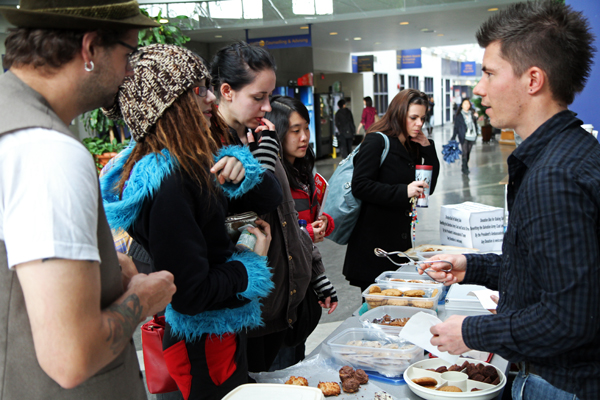
Stephan Struve, a member of the President's Ambassadorial Team (PAT), serves up baked goods to hungry students on their way to and from class last week. Many of the baked good were made by PAT members. The bake sale was held in the rotunda at Kwantlen's Richmond campus. (Photo by Jeffrey Yip)
It might not be snowing right now, but the President’s Ambassadorial Team (PAT) hopes students will continue donating their old coats to help the homeless.
The PAT coat drive is collecting “gently-used” men’s and women’s coats, blankets, gloves, hats and new socks, with the donations going to “homeless shelters in the communities that Kwantlen serves.”
Clothing donation boxes, decorated with Christmas wrapping paper, can be found in any of the Kwantlen libraries.
“The [coat] drive was an initiative of one of the PAT members, Patricia Coburn. She and I talked about doing a Kwantlen gives back type thing,” said Shelley Coburn, a recent Kwantlen graduate, who now works for external relations for the president’s office.
PAT is a group of 16 outstanding students who work directly with the president and represent Kwantlen at different functions in the community.
As part of the coat drive, PAT held a bake sale at the Richmond campus on Dec. 8 and will hold another at the Surrey Campus on Dec. 9 from 10:30 a.m. to 2:30 p.m.
“With the money that we’re raising through the bake sale and other donations, we’re going and buying [more] new socks, new hats and new mittens,” Coburn said. “Social justice is something that is important to one of the PAT members and the whole team has pulled together and supported this initiative. It’s nice to give back to the community.”
Coburn believes the harsh winter weather in November made many students aware of the need to give. “People made the connection: ‘It’s very cold and I’m lucky, so I’ll donate,’” Coburn said. “We’ve seen a huge increase in the amount of clothing coming in towards the end of the coat drive.”
According to Coburn, PAT has collected about 16 “gigantic” garbage bags full of clothing so far. Officially, the coat drive ended on Friday, Dec. 10, but Coburn says the boxes will be in the libraries until early next week.
Infographic: Comparing the cost of an education
November 23, 2010 by Jeffrey Yip · Leave a Comment
Jeffrey Yip and Hayley Woodin have compiled information on the cost of getting a university education in B.C. and present it in the form of an interactive graphic (Flash is required). You can see a detailed breakdown of the separate costs that add up to the total, and compare the cost of a university education at Kwantlen with other post-secondary institutes in the province.
Lack of interest cancels road hockey tournament
October 5, 2010 by Jeffrey Yip · Leave a Comment
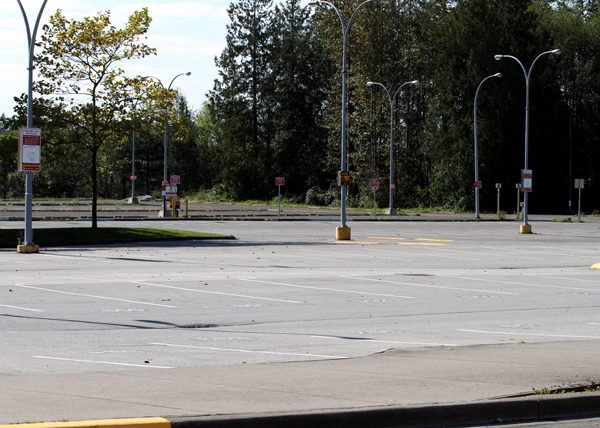
The Surrey campus parking lot sits empty following the cancellation of the recreation department's road hockey tournament
It was the beautiful Saturday morning. Warm. Sunny. The perfect morning to play some road hockey.
But, instead of the sounds of hockey sticks hitting pavement and the cheers of spectators, the only sounds in the parking lot at Kwantlen’s Surrey campus was the occasional passing car.
Thee Kwantlen Athletics and Recreation department was forced to cancel its road hockey tournament that was suppose to take place on Saturday, Oct. 2.
“There wasn’t enough teams,” John Stewart, recreation events coordinator, said. According to Stewart, only three teams and three individuals registered for the tournament.
“We wanted this to be a viable tournament. We actually lose money on this event. So, we needed a minimum of six teams for the tournament to go ahead,” Stewart said.
Unfortunately for Kwantlen Recreation, failed sporting events are becoming a recurring theme.
“We’ve had some successes, but it’s pretty hit and miss,” said Stewart.
Stewart believes that the struggles the department has had in generating student support for these types of events, is their inability to get their message out. With very few people following them on either Facebook or Twitter, flyers posted around campus, announcements on myKwantlen and word of mouth aren’t doing enough to get students interested and participating in these events.
“We have such a small [recreation] area down here,” said Stewart. “A lot of people don’t know what things are happening.”
To combat this, Stewart and the recreation department are trying a new strategy in order “to bring rec to the students.”
According to Stewart, the department is going to set up a recreation committee, made up of members from the recreation department, the KSA and volunteer students. The idea is to get the students more involved in the process and tell the recreation department what kinds of events interest them.
Stewart hopes that by getting students involved, it will create more enthusiasm in the student community for events such as the road hockey tournament.
Langley’s farmers market at Kwantlen continues to grow
September 25, 2010 by Jeffrey Yip · Leave a Comment
An interview with Susan Davidson, vice chair of the Langley Community Farmers Market board of directors, about the farmers market and their partnership with Kwantlen’s Langley campus. For more information visit the Langley Community Farmers Market website. Video by Jeffrey Yip and Matt Law.
Kwantlen’s ISH lab finds a second home in Cuba
September 25, 2010 by Jeffrey Yip · Leave a Comment
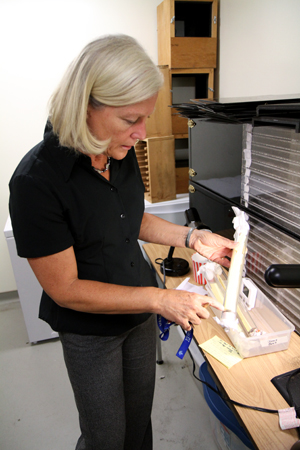
Dr. Deborah Henderson showing how trichogramma sibericum, a tiny parasitic wasp, is produced at the Institute for Sustainable Horticulture's research lab. The wasp is used to help control fireworms, an insect pest that attacks cranberries. (Photo by Jeffrey Yip)
While it still hasn’t put its sign up, the Institute for Sustainable Horticulture lab, or ISH lab, is now up and running.
“I’m glad you came a year after opening … because when it opened we had an empty lab,” Dr. Deborah Henderson said.
Henderson has a PhD in entomology from UBC and a post doctorate in medical entomology from the University of Toronto. Before coming to Kwantlen, she had her own company, ES Crop Consulting Limited, a consulting company in agriculture that provided integrated pest management, monitoring services for farmers, and research and field trials in biological control products.
“It took far longer than I had ever thought to get it up and moving. But, we’re pretty functional now.”
While the ISH lab isn’t a teaching facility, its research project are very much integrated with Kwantlen’s School of Horticulture and the Environmental Protection Technology (EPT) program.
And one of the most important collaborations that the ISH lab has with the two programs is a project in Cuba.
Six students headed for Cuban farms
“There’s a food security project in Cuba and a number of field research trials going on there,” Henderson said. “So, we have six student going to Cuba at the end of October to spend three months working on bio control field trials on a cooperative farm. Two of them are EPT students and four of them are horticulture students.”
Henderson hopes to continue this project over the next three years.
“[W]e want to make it a regular program with Cuba, and integrate it into the new degrees that are in the School of Horticulture. So there could very well be in the future, a course that’s offered in Cuba in the winter term. The students would go down and take that course in Cuba and get credit here,” Henderson said.
According to Henderson, Cuba is the world leader in the use of biological controls, that is using fungi, viruses and other insects to control crop damaging insects.
When the Soviet Union collapsed in the early 1990s Cuba lost nearly 90 per cent of its imports, including food and petroleum products. As the country began to starve, the government enlisted the country’s farmers to find a solution to the food shortages. There answer was to turn much of the available space in the cities into organic vegetable gardens. Because the gardens were in the cities, the food was organically grown, with no chemical pesticides. Instead they used bio controls.
“They’re still using chemicals for some production out in the country,” Henderson said.
“So, the project that we’re working on is the conversion of large cooperative farms to ecological methods. And the students are going to be involved in that. [W]e have a 600-hectare farm that has agreed to convert to these ecological methods.”
Working closer to home
Closer to home, the ISH lab is also conducting research with biological controls. The biological controls the ISH lab works on are a naturally occurring part of the ecosystem. The lab isolates them, makes more of them and tests them to see how effective they are in controlling insects that damage food crops.
But, unlike other labs, Henderson wants their research to go one step further and take successful bio control products all the way to commercialization.
“We’ve got to get products in the hands of growers or else our research isn’t benefiting the people that need the research done,” Henderson said.
A major part of the lab’s work with bio controls has to do with horticultural sustainability. For the ISH lab, achieving sustainability will also focus on how climate change will affect food production, and looking into new production systems that are closer to market will reduce the use of fossil fuels to bring products from far away.
“We are very unsustainable as a species. We have to become sustainable. So any time we can replace unsustainable practices we’re a step towards that goal. And so my particular expertise and experience is doing exactly that,” Henderson said.
“[W]e are going to have to face the reality of climate change. We have a responsibility to take care of our own food security. How can we help anybody else when we can’t feed of ourselves. And right now we don’t feed of ourselves.”
British Columbians ‘want sustainable food production’
According to Henderson, only four per cent of B.C.’s land is arable, that is land that can be used for growing crops. But, Henderson believes British Columbians are sensitive to food security issues and want food production to be sustainable.
“I think we are in great shape. [W]e grow close to 250 crops in B.C. already. So, in that sense we have a pretty big advantage over the Prairies for instance,” Henderson said.
“Quite honestly I think there’s a big social benefit to growing your own food close to home and knowing where your food comes from … and not being so divorced from it that you think it comes from a grocery store.”
As part of being sustainable, the lab itself is doing its part.
“It’s a beautiful facility. It’s been made to be as energy efficient as possible. We’ve applied for LEED certification on it, that’s a designation for environmentally friendly buildings,” Henderson said.
The lab has two sides: microbiology, where they do the research on fungi, and entomology, where they do research with insects and insect viruses. The lab also has production facilities for making fungi and rearing predator and parasitoid insects.
Overall, Henderson seems pleased with the progress the lab has made over the past year, especially in its collaboration with Kwantlen’s horticulture and EPT programs.
“The kind of things we do now with students, I’ve written internships into all of our research proposals,” said Henderson.
“So many of our programs are applied focused … so our research is [also] applied focused. And they enhance each other.”
“We’ve got a little turf project where we’re going to look at compost on turf and so I’m going to communicate with the turf instructors to say, ‘Would you like to get your students involved? Here’s what I have in mind. Do you have any better ideas?’ And we’ll do it with them so that students can be involved.”




